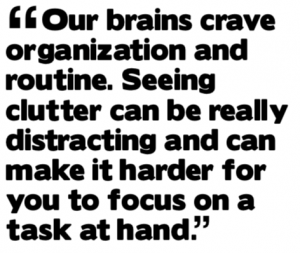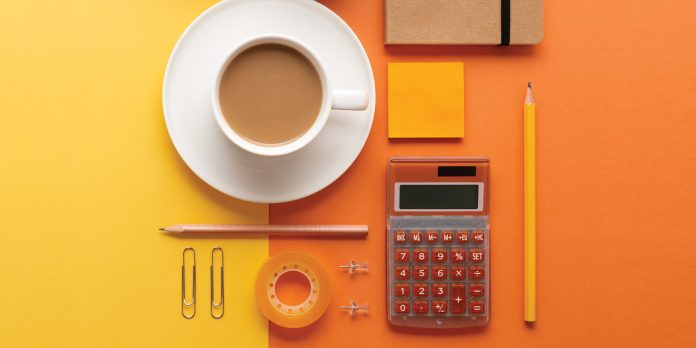How lessening our emotional attachment to “stuff” can improve our mental health and wellbeing.
By: Alicia Carter
Tchotchkes, your days are numbered!
Call them what you will — doodads, knickknacks, keepsakes, bric-a-brac, souvenirs — when we lift the veil of cutesy nicknames it all boils down to one thing: clutter. And in this new modern age of minimalism, that simply won’t do. Ever since “Tidying Up” premiered on Netflix in January of last year, the show has inspired a wave of people to pare down the clutter to create more orderly spaces, including tossing out all belongings that no longer “spark joy.”
Call it the Marie Kondo effect, but the minimalism trend has only grown in popularity. Decluttering influencers are now peddling 30-day decluttering handbooks and calendars all across social media. Bullet journaling has evolved scrapbooking into an organization system. There’s even a new trend called “Swedish death cleaning” — we won’t get into it. On a more personal note, this mere writer has now been assigned the task of waxing poetic on the joys of sparse, clean spaces. I wouldn’t exactly say I’m an expert on the subject.
Hi, I’m Alicia, and I’m a clutter-holic.
If you saw my workspace you would know that I have a thing for stuff. For example, my daughter gifted me a lovely craft of a turkey made out of a pinecone (yes, a pinecone). This craft has sat on my desk since Thanksgiving 2017. Following a content meeting that landed this hot topic in my lap for this issue, a sweet and extremely organized co-worker walked me through the process of eliminating some of the “stuff” on my desk. A hand-me-down keychain from a friend? Gone. The box that a sweet gift from co-workers came in? Toss it. But what really tipped me over the edge was when this co-worker, as well-meaning as she was, asked me to part with my dear, sweet turkey made out of a pinecone. I could’ve cried. Did this turkey bring me joy? Yes. Was it still clutter? Unfortunately, yes.
That’s when I realized this whole decluttering trend goes beyond simply cleaning up your space. As “collectors,” as I like to call my people, we tend to have an unhealthy attachment to stuff. In many cases, this emotional attachment can cause us to figuratively drown in a sea of, as yet another dear co-worker put it, crap. (But really, really sentimental crap, you know?) The question remains: How do we escape from this emotional attachment to things?

“We attach meaning and memories to material things which is why it can be hard to say goodbye to them,” says Laura Lebovitz, a Licensed Marriage and Family Therapist with Grow Counseling in Suwanee. “It’s important to remember that we are actually attached to the memory connected to the item more so than the item itself. The emotions and memories live in our heads and in our hearts. They do not need the physical item to continue to exist.”
It makes sense. It wasn’t the actual turkey made out of a pinecone I was attached to, it was the memory of my daughter so excited to show me what she created. As sweet as it was, it was time to let it go. After all, if we’re not careful, this unhealthy attachment to stuff can ultimately have a negative effect on our mental health and emotional wellbeing.
“Our brains crave organization and routine,” Lebovitz says. “Seeing clutter can be really distracting and can make it harder for you to focus on a task at hand. Studies have shown that clutter can also make you feel more stressed, anxious and depressed. Clutter increases the levels of the stress hormone, cortisol, that we have in our bodies which over time can make us feel like we are constantly in fight or flight mode. Too much clutter can also make you more likely to isolate yourself from others which can affect your sense of connection and overall sense of wellbeing.”
So maybe this decluttering trend isn’t so bad after all. In fact, it actually comes at a pretty timely point in my life as I’m currently planning to pack up my house to move in the near future. Recently, I was looking around my house and I started to feel extremely overwhelmed by all of the stuff surrounding me. (Anxious. Palms sweaty. You know the feeling.) Boxes of art projects, drawers of clothes I hadn’t worn in years, and not to mention probably every single toy my now-5-year-old daughter has ever owned. Did all of it bring me joy? Maybe not the stuff, but the memories certainly did.
This is the house my high school sweetheart and I bought after getting married. Its walls are filled with the memories of bringing home our first child and all the sleepless nights that followed. Nights I never thought I would get through but now look back at and desperately wish I could go back to, if even for just a moment. It’s where I first learned of my son’s diagnosis (on the phone in the kitchen) and the tears that filled every inch of that house. It’s also home to the pure joy that followed when we brought him home from the hospital only to see him finally smile at six months old while I was giving him a bath — the same bathtub in which my daughter discovered her love for bath bombs.
Sure, all these memories are important and have made me the woman I am today, but does that really mean I need a random Hamburglar toy from McDonald’s that my kids will never truly appreciate (let alone understand the reference)? Nope. So out it goes.
Lebovitz goes on to say that the first step to addressing this emotional attachment is to start with something small or an area that feels the most cluttered and work your way up. “It’s important to first try to connect with why you want to hang on to that item,” she says. “What emotions, experience or memory does it represent? Accessing those helps you to recognize that you are attached to those memories and not actually connected to the item itself.”
If you’re ready to let go of some of the stuff cluttering your home, there are many local organizations who would be happy to take it off your hands. The North Gwinnett Co-op, HOPE for Domestic Violence, and Quinn House are all charitable organizations in need of donations. The Kidney Foundation, No Longer Bound and Habitat for Humanity will all come out to your house to pick up donations if you’re unable to make it to a center. And there’s always old faithful: Goodwill.
In an age of overconsumption, getting rid of unnecessary items can bring people a sense of personal relief, pride and even a little joy — this pessimistic clutter-holic included.

















